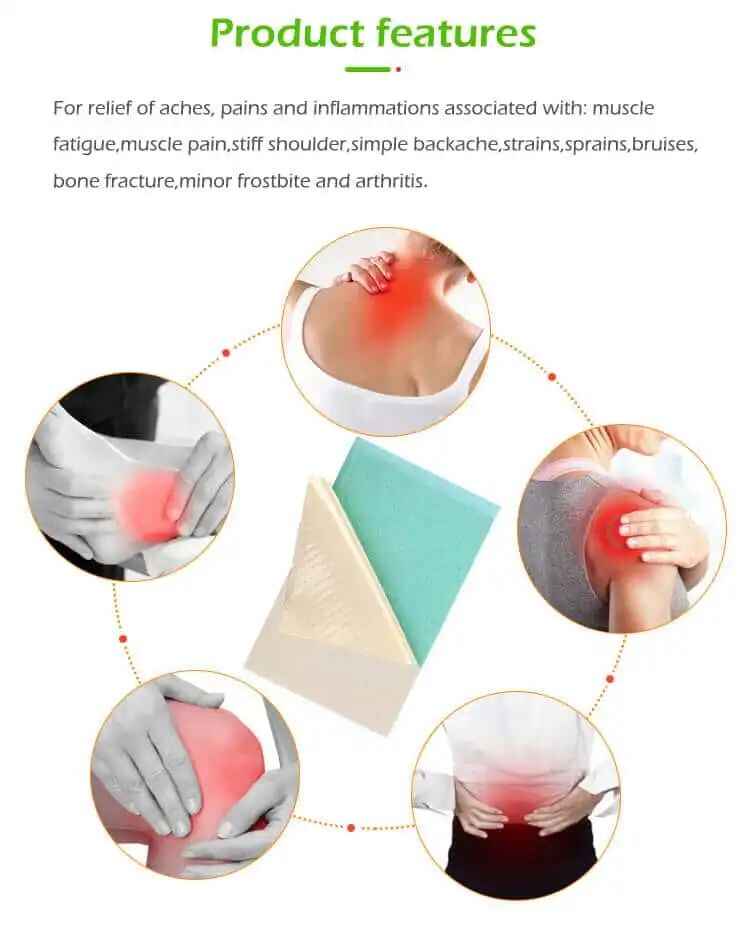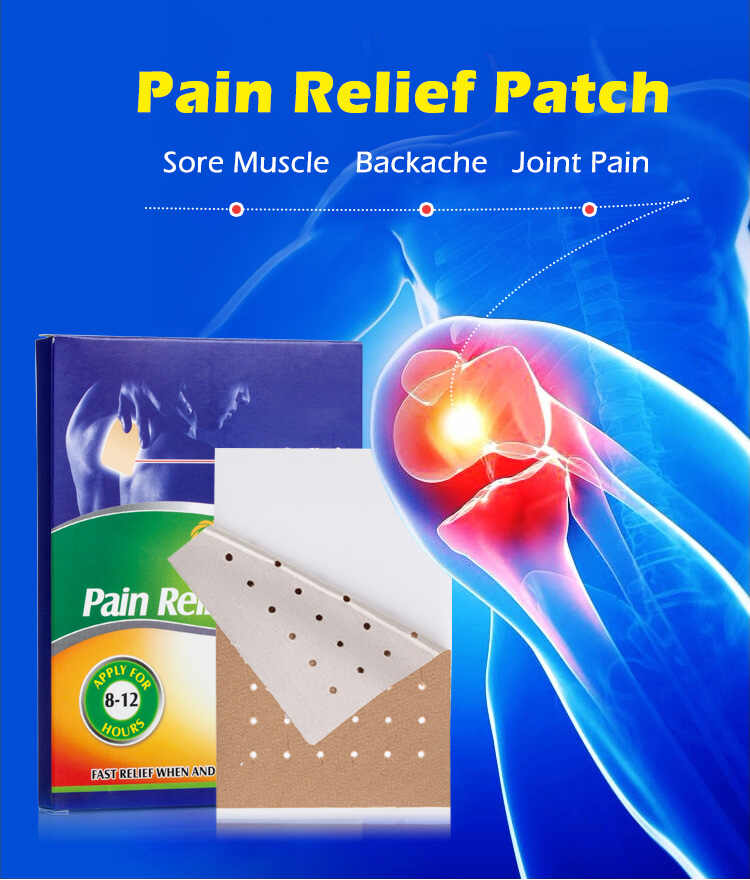Do Custom Effective Pain Relief Patches Require Clinical Testing?
As the demand for non-invasive pain relief products continues to grow, many brands are turning to Custom Effective Pain Relief Patches as a unique and effective solution. However, one critical question often arises: Do custom pain relief patches require clinical testing?
This article provides an in-depth and persuasive discussion around the clinical testing requirements for Custom Effective Pain Relief Patches. We will explore regulatory obligations, the importance of safety and efficacy data, and what role your Effective Pain Relief Patches Manufacturer plays in this crucial aspect of product development.

Why Clinical Testing Is Important for Pain Relief Patches
Pain relief patches are transdermal products, meaning they deliver active ingredients directly through the skin into the bloodstream or targeted areas. As such, they can be categorized in various ways depending on formulation and function:
Cosmetic patches – Often require minimal testing
Medical device patches – Require compliance with regulatory bodies like the FDA, EMA, or CFDA
Drug-containing patches – Require full clinical trials
Key Reasons Clinical Testing Matters:
User safety: To prevent skin irritation, allergic reactions, or toxicity
Product efficacy: To prove that the patch works as claimed
Market acceptance: Most retailers and healthcare providers require data-backed products
Legal compliance: Different regions have strict rules on medical and therapeutic claims
Do All Custom Effective Pain Relief Patches Require Clinical Testing?
The answer is not always, but often yes, especially if your product makes therapeutic claims or contains active pharmaceutical ingredients (APIs).
When Clinical Testing Is Required:
Therapeutic Claims
If your Private Label Effective Pain Relief Patches promise to "reduce inflammation," "treat arthritis," or "relieve chronic pain," regulators classify it as a drug or medical device—both of which require clinical testing.Use of Active Pharmaceutical Ingredients
Ingredients such as lidocaine, diclofenac, or methyl salicylate are regulated. Patches containing these will need full clinical validation.International Market Expansion
If your Effective Pain Relief Patches OEM intends to export globally, clinical trials might be mandatory depending on target countries.New Formulations
If your Custom Effective Pain Relief Patches use a novel delivery system or a unique combination of ingredients, regulators often demand safety and performance data.
When Clinical Testing May Not Be Required
Some Effective Pain Relief Patches Suppliers develop products classified as cosmetic or wellness aids, especially if they:
Contain only herbal or natural ingredients (e.g., menthol, camphor)
Make general wellness claims like “soothes discomfort” or “promotes circulation”
Do not penetrate deeply into the skin or bloodstream
In such cases, the focus may shift from clinical testing to stability testing, dermatological testing, or consumer usage trials, depending on local regulations.
Role of an Effective Pain Relief Patches Manufacturer in Clinical Testing
A reputable Effective Pain Relief Patches Manufacturer plays a vital role in determining if clinical testing is needed and supporting the process. Here’s how:
✅ Regulatory Guidance
Your Effective Pain Relief Patches OEM should offer a compliance roadmap for your product based on its formulation, claims, and target markets.
✅ Technical Documentation
Manufacturers often provide:
Safety data sheets (SDS)
Certificates of analysis (COAs)
Toxicology reports
These documents support your regulatory submissions and product registrations.
✅ Test Management
Some Effective Pain Relief Patches Suppliers collaborate with third-party labs to coordinate:
Skin irritation tests
Sensitization testing
Patch adhesion and performance tests
✅ R&D and Formulation Support
A well-established Custom Effective Pain Relief Patches OEM can help optimize your product to reduce the need for extensive clinical testing by selecting compliant ingredients and delivery mechanisms.
Common Types of Clinical and Product Testing
To ensure your Private Label Effective Pain Relief Patches are compliant and effective, these types of testing may be required or recommended:
| Type of Test | Purpose |
|---|---|
| Skin Irritation & Sensitization | Checks for allergic or adverse skin reactions |
| Adhesion Testing | Assesses how well the patch stays on the skin |
| Pharmacokinetics (PK) | Evaluates how ingredients are absorbed/released |
| Efficacy Testing | Proves effectiveness in relieving pain |
| Consumer Use Trials | Offers real-world insights into performance |
| Stability Testing | Confirms shelf-life and effectiveness over time |
International Regulatory Requirements for Clinical Testing
If you're working with an Effective Pain Relief Patches Manufacturer to distribute internationally, consider the following:
?? United States – FDA
OTC products must comply with the FDA Monograph.
Products making drug claims require clinical trials under IND (Investigational New Drug) applications.
?? European Union – EMA and CE Mark
Medical device patches must meet MDR (Medical Device Regulation).
Herbal patches may still require dermatological testing and claims substantiation.
?? China – CFDA/NMPA
Highly regulated, especially for TCM-based or transdermal products.
Requires submission of clinical trial data for therapeutic claims.
? Rest of the World
Countries like Australia, Canada, and Japan also have strict guidelines.
Work with an Effective Pain Relief Patches OEM experienced in international compliance.
Cost and Timeline of Clinical Testing
Clinical testing for Custom Effective Pain Relief Patches varies widely in cost and complexity:
Basic dermatological test: $3,000–$10,000
Small-scale clinical efficacy study: $15,000–$50,000
Full clinical trial (drug-level compliance): $100,000+
Timelines range from 4 weeks to 12 months depending on the test type and regulatory requirements.
How to Minimize Clinical Testing Burden
A strategic Effective Pain Relief Patches Supplier can help reduce your testing load by:
Using pre-approved active ingredients under FDA monographs
Leveraging existing clinical data from previous formulations
Recommending general wellness claims instead of therapeutic promises
Conducting consumer perception studies instead of full trials
These approaches can help get your product to market faster and at a lower cost.
Final Thoughts: Clinical Testing and Market Success Go Hand in Hand
While not all Custom Effective Pain Relief Patches require full clinical trials, having validated data—especially around safety and efficacy—can give your brand a competitive advantage. It increases trust, opens doors to global markets, and supports long-term success.
Partnering with a certified Effective Pain Relief Patches Manufacturer ensures you not only meet regulatory expectations but also deliver on your brand promise. Whether you're developing Private Label Effective Pain Relief Patches or launching a new wellness brand, clinical testing is an investment in quality, credibility, and consumer satisfaction.
Frequently Asked Questions (FAQs)
❓Do all pain relief patches need clinical testing?
No. Only those with active pharmaceutical ingredients or strong therapeutic claims usually require clinical trials. Herbal or wellness patches may only need dermatological testing.
❓Can a manufacturer help with clinical testing?
Yes. A qualified Effective Pain Relief Patches Manufacturer often provides regulatory guidance, product testing services, and documentation support.
❓What is the difference between dermatological testing and clinical trials?
Dermatological testing checks for skin reactions, while clinical trials prove a product's therapeutic effect and safety through broader population studies.
❓What if I only want to sell in the U.S.?
Your Effective Pain Relief Patches OEM must ensure the product complies with the FDA’s OTC Monograph or submit data under IND regulations for drug-level claims.
❓Can using natural ingredients eliminate the need for clinical testing?
Not entirely. Even natural ingredients can cause skin reactions, so safety testing is still advised.
❓How long does testing take?
Testing can take anywhere from 4 weeks to 12 months depending on the type and regulatory requirement.






